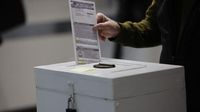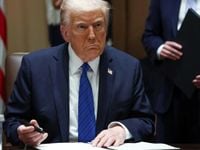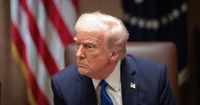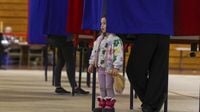CONCORD, N.H. (AP) — In a significant shift in voting regulations, New Hampshire's recent town elections have highlighted the implications of a new state law mandating proof of U.S. citizenship for voter registration. This law has already affected local residents, as evidenced by a voter in Milford who missed the opportunity to approve a $19 million operating budget, and an 18-year-old high school student in Durham who was unable to participate in key decisions regarding the school board and funding for athletic facilities.
The experiences of these voters, shared by town clerks, could serve as a cautionary tale for the rest of the nation as Congress considers the Safeguard American Voter Eligibility Act (SAVE Act), which aims to implement similar requirements across the country. On March 25, 2025, President Donald Trump signed an executive order that echoes these state-level changes, requiring documentary proof of citizenship to register and vote in federal elections.
“Everything that conservatives tried to downplay, New Hampshire told us exactly what would happen on a national scale under the SAVE Act,” remarked Greta Bedekovics, a former policy adviser for Senate Democrats now with the Center for American Progress.
Voting rights advocates have expressed particular concern that married women who have changed their names will face additional challenges when registering, as their birth certificates may list their maiden names. This was the case for Brooke Yonge, a 45-year-old hairstylist in Derry, who encountered difficulties when her name on her birth certificate did not match her driver’s license. After three trips to her polling place, she ultimately returned with her marriage license to prove her name change. "If I did a little research, I probably would have known that is what I needed," Yonge said, acknowledging the hassle.
New Hampshire is among 20 states that allow same-day voter registration. However, according to the New Hampshire Campaign for Voting Rights, at least 56 individuals who attempted to register on the day of the town elections were turned away, raising concerns about voter disenfranchisement. Derry’s town clerk, Tina Guilford, expressed her worries about the upcoming general election in November, anticipating higher turnout and more potential issues. “It’s just heartbreaking to me to see people turn around and think, ‘I hope they come back,’” she said.
The new law has garnered broad support in New Hampshire, with about 80% of voters favoring the requirement for proof of citizenship, as reported by AP VoteCast. This includes a significant majority of Trump voters as well as over half of those who supported Democratic Vice President Kamala Harris in the 2024 election.
Despite the support, critics argue that such requirements could disenfranchise millions of eligible voters who do not have easy access to the necessary documents. Research has shown that voting by noncitizens is rare, often occurring by mistake rather than as an intentional act to undermine elections.
In Congress, the House passed legislation last year to require proof of citizenship for voter registration, but it stalled in the Senate amid Democratic opposition. With Republicans now in full control, the House is expected to revisit the issue soon. Trump’s recent executive order underscores his administration’s urgency in implementing these changes without waiting for congressional action.
The executive order, titled “Preserving and Protecting the Integrity of American Elections,” mandates that voters submit documentation such as a U.S. passport or birth certificate to prove their citizenship. It also requires federal agencies, including the Department of Homeland Security, to share data to help identify noncitizens on voter rolls. Critics, however, have pointed out that approximately 146 million Americans do not possess a passport, which could hinder their ability to register.
In addition to the citizenship requirement, the executive order stipulates that all mail ballots must be received by Election Day to be counted, aligning with the practices of many states but contradicting those that allow ballots postmarked by Election Day to be counted if they arrive later. This could significantly impact voters in states like California, which allows ballots to be counted up to seven days after the election.
States that do not comply with the new requirements risk losing federal election funding. This could place considerable financial pressure on states that currently have more flexible voting procedures. The executive order also instructs the Secretary of Homeland Security to ensure states have access to systems capable of verifying the citizenship status of individuals registering to vote.
Legal experts predict that Trump’s executive order will face immediate challenges, as the Constitution grants authority over elections to the states, not the federal government. Arizona Secretary of State Adrian Fontes has already indicated that he and the state Attorney General are considering a lawsuit against the order, describing it as an attempt to federalize elections.
“It’s very methodical, and very, very dangerous,” Fontes remarked, suggesting that the order could create an illusion of misconduct in the electoral process, potentially justifying further federal intervention.
In New Hampshire, state lawmakers are considering additional changes to the law, including a bill that would create vouchers for low-income voters to obtain birth certificates, though opponents argue that asking voters to declare themselves poor is demeaning. The bill would also require the Secretary of State to verify citizenship for those unable to provide documentation, but critics have noted that this could be problematic given the limitations on available records.
As the debate over voter registration requirements continues, the experiences of New Hampshire voters serve as a microcosm of the national conversation surrounding voting rights and access. With both state and federal legislation evolving rapidly, the implications for American democracy are profound and far-reaching.







